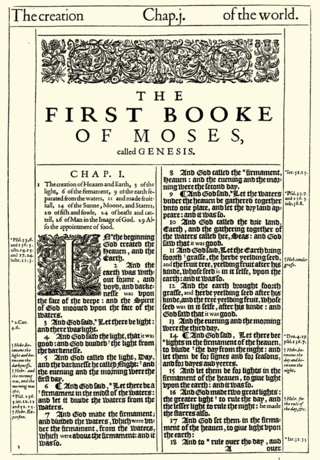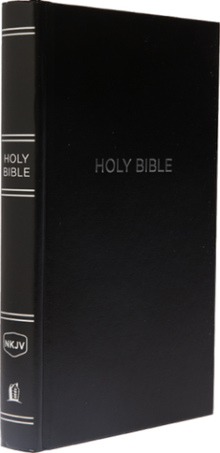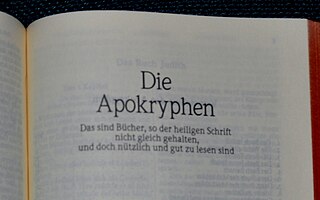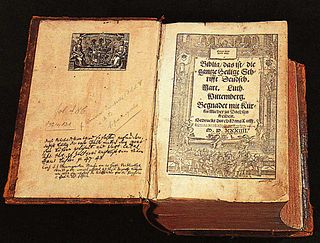
The King James Version (KJV), also the King James Bible (KJB) and the Authorized Version (AV), is an Early Modern English translation of the Christian Bible for the Church of England, which was commissioned in 1604 and published in 1611, by sponsorship of King James VI and I. The 80 books of the King James Version include 39 books of the Old Testament, 14 books of Apocrypha, and the 27 books of the New Testament. Noted for its "majesty of style", the King James Version has been described as one of the most important books in English culture and a driving force in the shaping of the English-speaking world.

The Geneva Bible is one of the most historically significant translations of the Bible into English, preceding the King James Version by 51 years. It was the primary Bible of 16th century English Protestantism and was used by William Shakespeare, Oliver Cromwell, Scotsman John Knox, John Donne, and others. It was one of the Bibles taken to America on the Mayflower. The Geneva Bible was used by many English Dissenters, and it was still respected by Oliver Cromwell's soldiers at the time of the English Civil War, in the booklet The Souldiers Pocket Bible.

The Scofield Reference Bible is a widely circulated study Bible edited and annotated by the American Bible student Cyrus I. Scofield, which popularized dispensationalism at the beginning of the 20th century. Published by Oxford University Press and containing the entire text of the traditional, Protestant King James Version, it first appeared in 1909 and was revised by the author in 1917.

Textus Receptus refers to the succession of printed editions of the Greek New Testament from Erasmus's Novum Instrumentum omne (1516) to the 1633 Elzevir edition.

The Revised Standard Version (RSV) is an English translation of the Bible published in 1952 by the Division of Christian Education of the National Council of the Churches of Christ in the USA. This translation itself is a revision of the American Standard Version (ASV) of 1901, and was intended to be a readable and literally accurate modern English translation which aimed to "preserve all that is best in the English Bible as it has been known and used through the centuries" and "to put the message of the Bible in simple, enduring words that are worthy to stand in the great Tyndale-King James tradition."

The Revised Version (RV) or English Revised Version (ERV) of the Bible is a late 19th-century British revision of the King James Version. It was the first and remains the only officially authorised and recognised revision of the King James Version in Great Britain. The work was entrusted to over 50 scholars from various denominations in Great Britain. American scholars were invited to co-operate, by correspondence. Its New Testament was published in 1881, its Old Testament in 1885, and its Apocrypha in 1894. The best known of the translation committee members were Brooke Foss Westcott and Fenton John Anthony Hort; their fiercest critics of that period were John William Burgon, George Washington Moon, and George Saintsbury.

The King James Only movement asserts the belief that the King James Version (KJV) of the Bible is superior to all other translations of the Bible. Adherents of the King James Only movement, mostly members of The Church of Jesus Christ of Latter-day Saints, Conservative Anabaptist, traditionalist Anglo-Catholics, Conservative Holiness Methodist and some Baptist churches, believe that the KJV needs no further improvements because it is the greatest English translation of the Bible which was ever published, and they also believe that all other English translations of the Bible which were published after the KJV was published are corrupt.

The Joseph Smith Translation (JST), also called the Inspired Version of the Holy Scriptures (IV), is a revision of the Bible by Joseph Smith, the founder of the Latter Day Saint movement, who said that the JST/IV was intended to restore what he described as "many important points touching the salvation of men, [that] had been taken from the Bible, or lost before it was compiled". Smith died before he deemed it complete, though most of his work on it was performed about a decade beforehand. The work is the King James Version of the Bible (KJV) with some significant additions and revisions. It is considered a sacred text and is part of the canon of Community of Christ (CoC), formerly the Reorganized Church of Jesus Christ of Latter Day Saints, and other Latter Day Saint churches. Selections from the Joseph Smith Translation are also included in the footnotes and the appendix of the LDS-published King James Version of the Bible, but the Church of Jesus Christ of Latter-day Saints has only officially canonized certain excerpts that appear in its Pearl of Great Price. These excerpts are the Book of Moses and Smith's revision of part of the Gospel of Matthew.
Partial Bible translations into languages of the English people can be traced back to the late 7th century, including translations into Old and Middle English. More than 100 complete translations into English have been written. A number of translations have been prepared of parts of the Bible, some deliberately and some projects have been abandoned.

The Douay–Rheims Bible, also known as the Douay–Rheims Version, Rheims–Douai Bible or Douai Bible, and abbreviated as D–R, DRB, and DRV, is a translation of the Bible from the Latin Vulgate into English made by members of the English College, Douai, in the service of the Catholic Church. The New Testament portion was published in Reims, France, in 1582, in one volume with extensive commentary and notes. The Old Testament portion was published in two volumes twenty-seven years later in 1609 and 1610 by the University of Douai. The first volume, covering Genesis to Job, was published in 1609; the second, covering the Book of Psalms to 2 Maccabees plus the three apocryphal books of the Vulgate appendix following the Old Testament, was published in 1610. Marginal notes took up the bulk of the volumes and offered insights on issues of translation, and on the Hebrew and Greek source texts of the Vulgate.

The New King James Version (NKJV) is a translation of the Bible in contemporary English. Published by Thomas Nelson, the complete NKJV was released in 1982. With regard to its textual basis, the NKJV relies on a recently published critical edition for the Old Testament, while opting to use the Textus Receptus for the New Testament.

Modern English Bible translations consists of English Bible translations developed and published throughout the late modern period to the present.

The New Cambridge Paragraph Bible with the Apocrypha is a newly edited edition of the King James Version of the Bible (KJV) published by Cambridge University Press in 2005. This 2005 edition was printed as The Bible in 2006. The editor is David Norton, Reader in English at Victoria University of Wellington, New Zealand. Norton is author of A History of the Bible as Literature (1993) revised and condensed as A History of the English Bible as Literature (2000). He wrote A Textual History of the King James Bible as a companion volume to the New Cambridge Paragraph Bible.

Frederick Henry Ambrose Scrivener was a New Testament textual critic and a member of the English New Testament Revision Committee which produced the Revised Version of the Bible. He was prebendary of Exeter, and vicar of Hendon.
There have been various debates concerning the proper family of biblical manuscripts and translation techniques that should be used to translate the Bible into other languages. Biblical translation has been employed since the first translations were made from the Hebrew Bible into Greek and Aramaic. Until the Late Middle Ages, the Western Church used the Latin Vulgate almost entirely while the Eastern Church, centered in Constantinople, mostly used the Greek Byzantine text. Beginning in the 14th century, there have been increasing numbers of vernacular translations into various languages. With the development of modern printing techniques, these increased enormously.

Jehovah is a Latinization of the Hebrew יְהֹוָהYəhōwā, one vocalization of the Tetragrammaton יהוה (YHWH), the proper name of the God of Israel in the Hebrew Bible/Old Testament. The Tetragrammaton יהוה is considered one of the seven names of God in Judaism and a form of God's name in Christianity.

Matthew 11 is the eleventh chapter in the Gospel of Matthew in the New Testament section of the Christian Bible. It continues the narrative about Jesus' ministry in Galilee.

Matthew 15 is the fifteenth chapter in the Gospel of Matthew in the New Testament section of the Christian Bible. It concludes the narrative about Jesus' ministry in Galilee and can be divided into the following subsections:

The biblical apocrypha denotes the collection of apocryphal ancient books thought to have been written some time between 200 BC and AD 400. The Roman Catholic, Eastern Orthodox and Oriental Orthodox churches include some or all of the same texts within the body of their version of the Old Testament, with Roman Catholics terming them deuterocanonical books. Traditional 80-book Protestant Bibles include fourteen books in an intertestamental section between the Old Testament and New Testament called the Apocrypha, deeming these useful for instruction, but non-canonical. To this date, the Apocrypha are "included in the lectionaries of Anglican and Lutheran Churches". Anabaptists use the Luther Bible, which contains the Apocrypha as intertestamental books; Amish wedding ceremonies include "the retelling of the marriage of Tobias and Sarah in the Apocrypha". Moreover, the Revised Common Lectionary, in use by most mainline Protestants including Methodists and Moravians, lists readings from the Apocrypha in the liturgical calendar, although alternate Old Testament scripture lessons are provided.

A Protestant Bible is a Christian Bible whose translation or revision was produced by Protestant Christians. Such Bibles comprise 39 books of the Old Testament and 27 books of the New Testament, for a total of 66 books. Some Protestants use Bibles which also include 14 additional books in a section known as the Apocrypha bringing the total to 80 books. This is in contrast with the 73 books of the Catholic Bible, which includes seven deuterocanonical books as a part of the Old Testament. The division between protocanonical and deuterocanonical books is not accepted by all Protestants who simply view books as being canonical or not and therefore classify books found in the Deuterocanon, along with other books, as part of the Apocrypha. Sometimes the term "Protestant Bible" is simply used as a shorthand for a bible which contains only the 66 books of the Old and New Testaments.
















